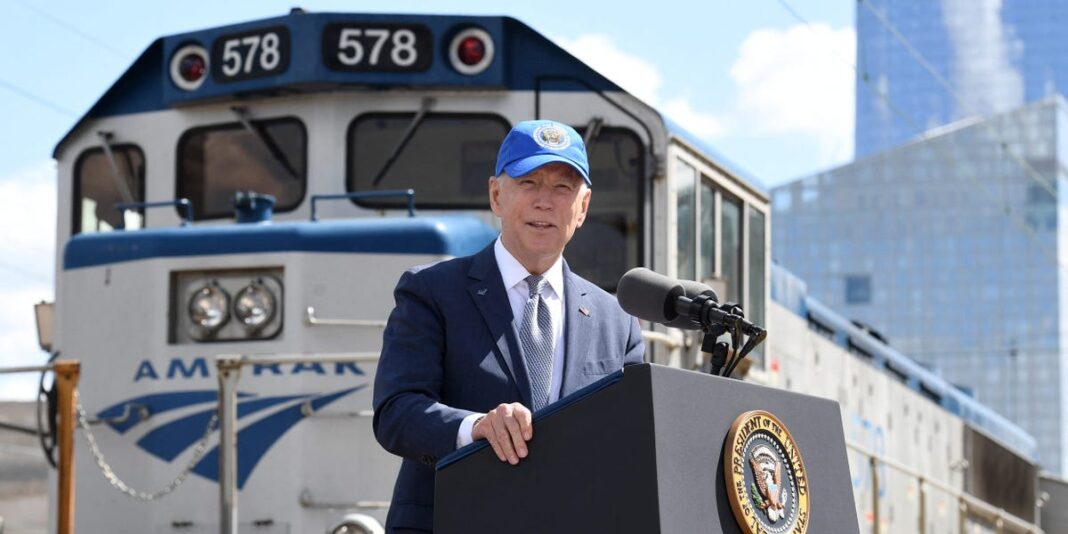- Biden is pouring $16.4 billion into passenger rail in the Northeast Regional corridor.
- The investments are expected to improve infrastructure and make trains faster.
- The funding is part of the bipartisan infrastructure law’s investment in rail.
President Joe Biden — a known proponent of Amtrak — wants trains to run faster and better. His administration is pouring $16.4 billion from the 2021 bipartisan infrastructure law into the Northeast Regional corridor to do just that.
“The president is a train guy. He believes strongly in improving America’s passenger rail and he knows the Northeast Corridor like no one else,” Mitch Landrieu, senior advisor to the president and White House infrastructure coordinator, said in a call with reporters announcing the new infusion of funding.
The Biden administration will funnel those billions towards 25 passenger rail projects on Amtrak’s key Northeast Corridor, which spans from Boston to Washington, DC, and serves 260 million passengers a year. Projects receiving funding include a new tunnel in Baltimore, running Metro-North service through New York’s Penn Station, and replacing a bridge in Connecticut.
Those improvements will make trains faster, per the administration. Replacing the Connecticut River Bridge will allow train speeds on that bridge to increase from 45 miles per hour to 70 miles per hour. Similarly, expanding Metro-North access in New York to Penn Station will mean a shorter commute for some: The administration estimates the new service would cut transit time from the Bronx to Manhattan by up to 50 minutes.
“Before President Biden took office, federal, state and local governments spent only about 1% on rail what they spent on roads — and it shows,” Secretary of Transportation Pete Buttigieg said. “We’re changing that.”
The new infusion of cash comes after the bipartisan infrastructure law allotted $66 billion for the Federal Railroad Administration and Amtrak — what the administration has said is the largest investment in passenger rail since 1971, when Amtrak was first founded.
Amtrak already lags behind other countries when it comes to timeliness and speed. In 2020, the European Union rail system saw average punctuality of 88.7% for regional and local passenger services, according to a European Commission report on the rail market. Meanwhile, 80% of Amtrak trains were on time in 2020 — and that fell to 74% by 2022. The Northeast Corridor fared slightly better, with 79% of those trains on time.
In 2020, then-Amtrak CEO Bill Flynn testified that the Northeast Corridor Commission estimated that the route had an over $40 billion repair backlog. He said that Amtrak and commuter passengers on the NEC “pay the cost, as they endure the unreliability that comes with depending on infrastructure never meant for today’s demands.”
After the passage of the bipartisan Infrastructure Investment and Jobs Act, Amtrak proposed a major expansion plan that would allow it to reach almost every major city, with a focus on currently underserved but fast-growing areas in the West and South.
Many congressional Republicans have repeatedly attempted to slash funding for passenger rail and other infrastructure priorities. The House is poised to vote in early November on a transportation funding bill that would strip about $1.5 billion in funding from Amtrak — an approximately 64% cut in the rail system’s annual federal funding.
But some Republicans who hail from the Northeast corridor have expressed concerns about the major cuts to Amtrak, forcing the body to delay the vote.
“The Northeast Amtrak corridor is actually one of the few that actually makes money and secondly is a major artery for commuters throughout the Northeast, but certainly in the Hudson Valley, and upstate New York,” Rep. Marc Molinaro, a New York Republican, said on Thursday. “We know that commuter rail in particular is often subsidized by taxpayer support. I’m all for responsible spending, but these are pretty significant reductions.”
Amtrak’s CEO has warned that if the Republican cuts are passed, the rail system would have to “radically reduce or suspend service” on a variety of routes, and halt essential repairs.
“We’re all on our way to creating world-class passenger rail that benefits communities nationwide by making our rail systems safer, more efficient, and more convenient,” Landrieu said. “And under this President’s leadership, we are going to get it done.”
Source link









